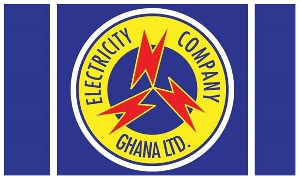 The Electricity Company of Ghana (ECG)
The Electricity Company of Ghana (ECG)
The Africa Sustainable Energy Centre (ASEC), a leading think-tank focused on sustainable energy and climate resilience, has called for partial privatisation of the Electricity Company of Ghana (ECG) as a strategic measure to alleviate the country’s ongoing power crisis.
ASEC argued that divesting some of ECG’s operations to private investors would allow the beleaguered state utility to concentrate on its core technical responsibilities, such as maintaining and upgrading its aging infrastructure.
The think-tank suggested that privatising administrative and commercial functions could enhance efficiency, improve revenue collection and reduce operational costs, ultimately stabilising the nation’s erratic power supply.
The call comes against a backdrop of increasing public frustration over irregular electricity supply, with Ghanaians frequently experiencing power outages known locally as ‘dumsor’. These disruptions have forced many households and businesses to turn to costly alternative energy sources, further straining the economy.
ECG’s troubles are well-documented, with the utility facing significant operational and financial challenges. Outdated infrastructure, inefficient technology and widespread electricity theft have contributed in its inability to deliver reliable power. Moreover, ECG’s financial health has been undermined by massive debts exacerbated by unpaid bills from residential, commercial and governmental customers.
“This division of responsibilities is crucial for improving operational efficiency, reducing power losses and enhancing service reliability,” ASEC said in a statement.
The group admits that despite mixed outcomes of these endeavours by some African countries, there is a huge potential for success since some other countries across the world are thriving on this model. In their expert opinion, this provides a unique opportunity for Ghana to learn from the mistakes of its counterparts and join the people who have benefitted.
“Critics of privatisation often point to the mixed outcomes of similar efforts in other African countries. However, these examples underscore the importance of learning from past experiences. Weak regulatory enforcement and lack of stakeholder engagement have been the main pitfalls in other nations.
“Ghana can avoid these mistakes by establishing robust regulatory frameworks, ensuring transparency in the privatisation process and actively involving all stakeholders. With these measures in place, privatisation can lead to significant improvements in ECG’s efficiency and service delivery,” ASEC asserted.
The Director of Research and Innovation at ASEC, Dr. Elvis Twumasi, expressed confidence in ECG’s ability to excel with such a development – citing the previous attempt with Power Distribution Services (PDS).
“The first attempt to privatise ECG showed promise, with Power Distribution Services Ghana Limited (PDS) planning to invest US$580million into the sector. During PDS’s brief tenure, there were notable improvements in employee responsiveness and operational efficiencies,” he said – adding that these initial successes indicate that with the right approach privatisation will bring about positive change.
“Success stories from other parts of the world highlight the potential benefits of privatisation. In South America, countries like Argentina, Peru and Bolivia have seen improved operational efficiency, reduced energy losses and enhanced customer service following privatisation efforts. In Uganda, the involvement of Umeme Ltd. in the power sector led to significant operational efficiencies and financial improvements, demonstrating how private sector participation can be beneficial,” he said.
Furthermore, he noted that privatisation does not mean totally selling off ECG to private owners. “It is crucial to clarify that privatisation does not mean selling ECG to foreign investors. Instead, Ghana can engage multiple local private companies to manage the economic functions of ECG; such as infrastructural development, billing and collection of utility bills.”
He asserted that this approach allows ECG to focus on the technical aspects of electricity distribution, improving efficiency and service delivery.
Privatisation, he contended, can address these problems by creating a system of checks and balances, ensuring fiscal discipline and bringing in management expertise. This will help reduce power and financial losses due to theft, outdated equipment and unpaid bills.
“Reliable electricity is not just a convenience but a necessity for economic development and improving living standards. The privatisation of ECG can lead to better service delivery, reduced costs and ultimately a more reliable and sustainable power sector,” he added.
While the path to successful privatisation is complex, with careful planning, robust regulatory frameworks and active stakeholder engagement, it can drive significant advancements in ECG’s services.
It is considered that this will contribute to the broader economic development of Ghana and improve the lives of its people, particularly poor and average citizens who have suffered most from the current inefficiencies.